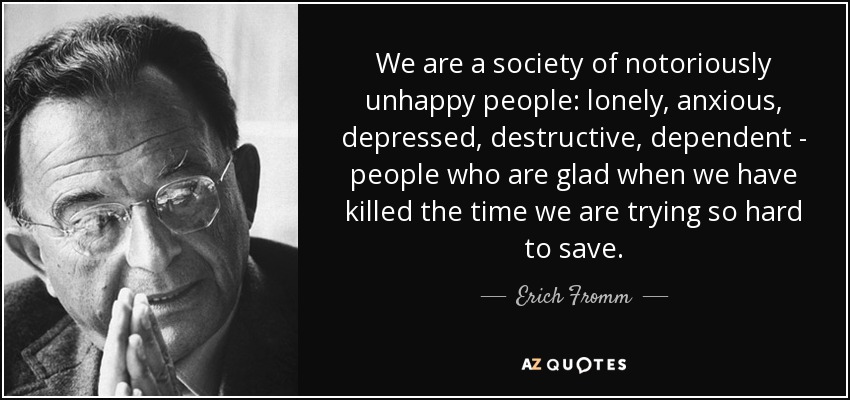
Alan: 50 years ago, this book was my first exposure to psycho-social analysis.
Every page was an epiphany.
Erich Fromm's "The Sane Society": Self-Love Is The Cornerstone
Maria Popova
“We are well advised to keep on nodding terms with the people we used to be, whether we find them attractive company or not,” Joan Didion famously wrote in making her case for the value of keeping a notebook. But many of us frequently find it hard enough to be on nodding terms even with the people we currently are. “We have to imagine a world in which celebration is less suspect than criticism,” psychoanalyst Adam Phillips wrote in contemplating the perils of self-criticism and how to break free from the internal critics that enslave us. And yet can we even imagine self-celebration — do we even know what it looks like — if we are so blindly bedeviled by self-criticism? Can we, in other words, celebrate what we cannot accept and therefore cannot love?
How to break this Möbius strip of self-rejection is what the great humanistic philosopher and psychologist Erich Fromm (March 23, 1900–March 18, 1980) explores in a portion of his timeless 1956 treatise The Sane Society (public library) — the source of Fromm’s increasingly timely wisdom on our best shot at saving ourselves from ourselves.

Erich Fromm
Fromm frames love as what he calls “the productive orientation” of the psyche, an “active and creative relatedness of man to his fellow man, to himself and to nature.” He writes:
In the realm of feeling, the productive orientation is expressed in love, which is the experience of union with another person, with all men, and with nature, under the condition of retaining one’s sense of integrity and independence. In the experience of love the paradox happens that two people become one, and remain two at the same time. Love in this sense is never restricted to one person. If I can love only one person, and nobody else, if my love for one person makes me more alienated and distant from my fellow man, I may be attached to this person in any number of ways, yet I do not love.

Art by Olivier Tallec from This Is a Poem That Heals Fish by Jean-Pierre Simeón
Just as self-compassion is the seedbed of compassion, Fromm argues that such all-inclusive love must begin with self-love:
If I can say, “I love you,” I say, “I love in you all of humanity, all that is alive; I love in you also myself.” Self-love, in this sense, is the opposite of selfishness. The latter is actually a greedy concern with oneself which springs from and compensates for the lack of genuine love for oneself. Love, paradoxically, makes me more independent because it makes me stronger and happier — yet it makes me one with the loved person to the extent that individuality seems to be extinguished for the moment. In loving I experience “I am you,” you — the loved person, you — the stranger, you — everything alive. In the experience of love lies the only answer to being human, lies sanity.
Fromm is careful to point out that in this “productive orientation,” love is not a passive abstraction but an active responsibility. Shortly before Martin Luther King, Jr. made his abiding case for the respectful and responsible love ofagape, Fromm writes:
Productive love always implies a syndrome of attitudes; that of care, responsibility, respect and knowledge. If I love, I care — that is, I am actively concerned with the other person’s growth and happiness; I am not a spectator. I am responsible, that is, I respond to his needs, to those he can express and more so to those he cannot or does not express. I respect him, that is (according to the original meaning of re-spicere) I look at him as he is, objectively and not distorted by my wishes and fears. I know him, I have penetrated through his surface to the core of his being and related myself to him from my core, from the center, as against the periphery, of my being.
The Sane Society is an enormously insightful read in its totality. Complement it with Fromm on the art of living, the art of loving, and how to transcend the common laziness of optimism and pessimism, then revisit this animated primer on the difficult art of self-compassion.
No comments:
Post a Comment